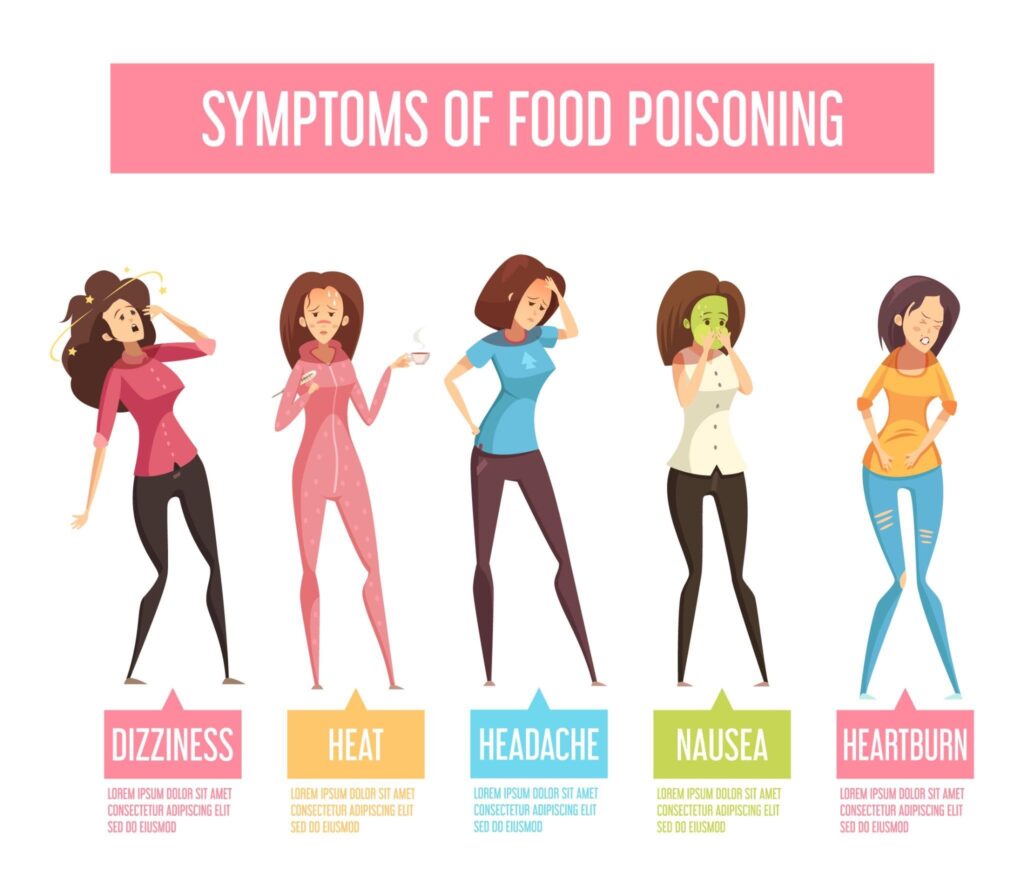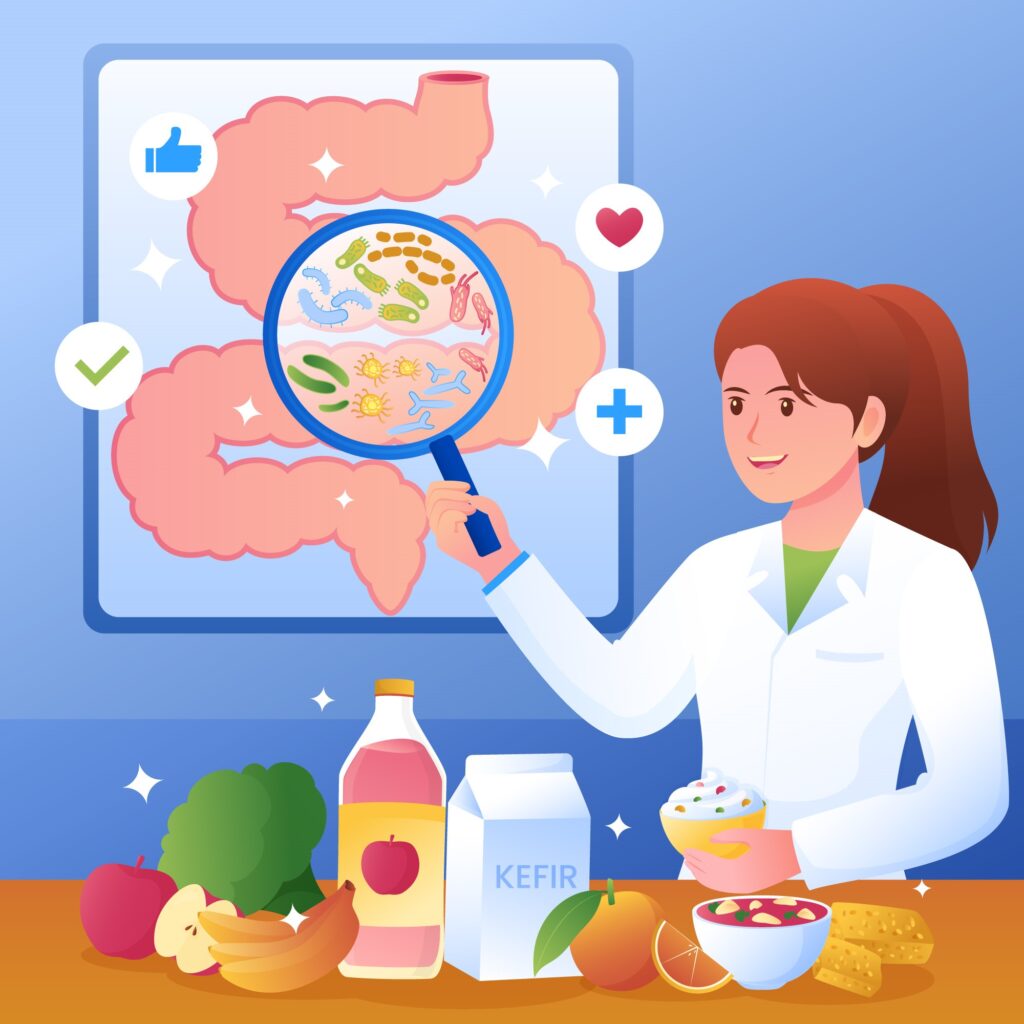Last updated on July 12th, 2025 at 12:38 pm
Food poisoning treatment has the primary focus on alleviating symptoms, restoring hydration, and aiding the body’s natural recovery process. Whether it’s from undercooked meat, contaminated vegetables, or improperly stored leftovers, food poisoning can strike when you least expect it. Understanding food poisoning treatments is an essential step towards a quicker and more comfortable recovery.
Food poisoning, also known as foodborne illness, happens when you consume food or beverages contaminated with harmful bacteria, viruses, parasites, or chemical substances. These contaminants can disrupt the normal functioning of your digestive system, leading to a range of symptoms, including nausea, vomiting, diarrhea, abdominal pain, and fever.
Food Poisoning Symptoms
Identifying the symptoms is the first step in seeking appropriate food poisoning treatments. Symptoms can vary depending on the type of contaminant and the individual’s sensitivity, but common signs include:
- Nausea and vomiting
- Diarrhea
- Abdominal cramps and pain
- Fever
- Muscle aches
- Headache
- Fatigue
These symptoms of Food Poisoning can appear within hours or days after consuming contaminated food or beverages and can last for a few hours to several days. In severe cases, especially when caused by certain bacteria like E. coli or Salmonella, food poisoning can lead to dehydration and require medical attention.

Food Poisoning Treatments
- Stay Hydrated: One of the most critical aspects of food poisoning treatments is maintaining proper hydration. Frequent vomiting and diarrhea can lead to fluid loss, which can quickly lead to dehydration. To counter this, drink clear fluids such as water, oral rehydration solutions, and clear broths. Sip small amounts at a time to avoid overwhelming your stomach.
- Rest: Your body needs time to heal, so get plenty of rest. Avoid strenuous activities and allow your immune system to focus on fighting off the infection as a treatment for food poisoning.
- Electrolytes: As a part of food poisoning treatments in addition to staying hydrated, consider consuming foods or drinks rich in electrolytes like potassium and sodium. Sports drinks or coconut water can help replace lost electrolytes and maintain the body’s electrolyte balance.
- BRAT Diet: The BRAT diet, which stands for bananas, rice, applesauce, and toast, can be helpful in easing gastrointestinal discomfort. These bland, easy-to-digest foods can provide necessary nutrients without further irritating your stomach.
- Avoid Certain Foods: While you’re recovering, steer clear of fatty, spicy, and dairy-heavy foods, as they can exacerbate gastrointestinal symptoms. It’s best to avoid caffeine and alcohol as well.
- Medications: Over-the-counter medications like loperamide (Imodium) can help reduce diarrhea symptoms, but it’s important to consult with a healthcare professional before using any medication, as some may not be suitable for your specific condition. Mild cases of food poisoning often improve with rest and hydration. However, if nausea and vomiting become severe, a doctor may recommend medications such as Avishal Tablet to control these symptoms and prevent fluid loss.
- Antibiotics: In some cases, especially when the food poisoning is caused by a bacterial infection and is severe, a healthcare provider may prescribe antibiotics. These should only be used under medical maintenance.
- Medical Attention: If your symptoms are severe, persist for more than a few days, or are accompanied by high fever, blood in your stool, or signs of dehydration (such as dark urine, dry mouth, or extreme thirst), seek medical attention promptly.
Read: What are Generic Medicines?

Prevention and Remedies of Food Poisoning
While knowing how food poisoning treatments are important, prevention is always the best approach. Here are some tips to reduce your risk of foodborne illnesses:
- Practice Safe Food Handling: Wash your hands and cooking utensils thoroughly, cook meat and poultry to safe temperatures, and refrigerate leftovers promptly.
- Choose Safe Food Sources: Buy food from reputable sources and check expiration dates. Avoid consuming raw or undercooked eggs, seafood, and meat, especially if you have a weakened immune system.
- Be Cautious with Leftovers: Reheat leftovers to a safe temperature (165°F or 74°C) before consuming them.
- Mind Food Storage: Store perishable items in the refrigerator or freezer promptly and use them within recommended timeframes.
- Pay Attention to Food Recalls: Stay informed about food recalls and avoid consuming products that have been recalled due to contamination concerns.

Conclusion:
Food poisoning treatments are essential knowledge for anyone who wants to recover quickly and safely from this common ailment. While most cases of food poisoning can be managed at home with proper hydration, rest, and dietary adjustments, it’s crucial to seek medical attention if symptoms are severe or persist. The best approach to dealing with food poisoning is prevention, so practice safe food handling and make informed choices when it comes to your diet to minimize the risk of contamination. Remember, your health is your most valuable asset, and knowing how to handle food poisoning is just one step toward protecting it.
> Consult a doctor and Order Medicine Online
Examples Of Generic Medicines
Generic medicines are identical in active ingredients, dosage, safety, and efficacy to their brand-name counterparts but typically cost significantly less. Examples include generic versions of well-known drugs like ibuprofen (generic for Advil), acetaminophen (generic for Tylenol), and simvastatin (generic for Zocor).
These generic options offer accessible and affordable alternatives for individuals seeking to manage pain, fever, or various medical conditions while maintaining the same level of quality and effectiveness as their brand-name counterparts.
FAQs on Food Poisoning Treatments
Q1. What is food poisoning treatment?
Food poisoning treatments involve measures to alleviate symptoms and promote recovery, including hydration, rest, and, in severe cases, medical intervention like antibiotics. The goal is to address the effects of ingesting contaminated food and restore the body to health.
Q2. What should I do if I suspect I have food poisoning?
If you suspect food poisoning, focus on staying hydrated by drinking clear fluids, rest, and avoiding spicy or fatty foods. If symptoms aggravate or persist, seek medical attention.
Q3. Are antibiotics always necessary for food poisoning treatments?
No, antibiotics are typically reserved for severe cases caused by specific bacteria. Most food poisoning cases resolve on their own with proper hydration and rest.
Q4. Can over-the-counter medications help with food poisoning symptoms?
Over-the-counter medications like loperamide (Imodium) may help alleviate diarrhea symptoms but should be used cautiously and with medical advice, as they may not be suitable for everyone.
Related Links: